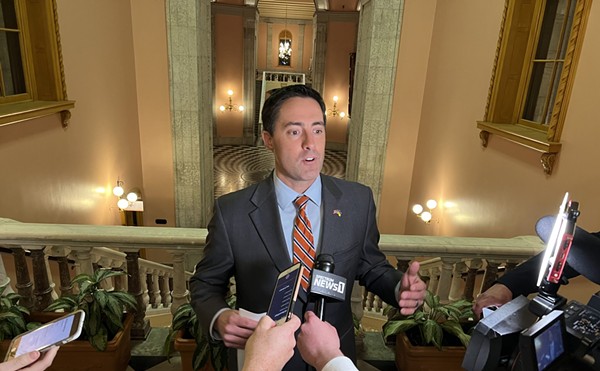In 2007, Carol Goland drove home from a meeting of the Dairy Labeling Advisory Committee in Reynoldsburg feeling optimistic. There had been heated debate over a seemingly simple issue: the fairest and most informative way to label dairy products made from cows that have not been injected with a controversial growth hormone intended to increase milk production.
The farmers using the hormone — commonly known as rBGH (recombinant bovine growth hormone), but also rBST (recombinant bovine somatotrophin) — were worried about losing business to competitors labeling their products as "rBGH-free." Goland, executive director of the Ohio Ecological Food and Farm Association, could empathize. Still, she'd argued — successfully, it would turn out — that Ohio consumers have the right to know how their food is produced.
But the matter did not stay settled. In February 2008, Ohio Department of Agriculture (ODA) head Robert Boggs issued a ruling that tilted the labeling issue in favor of farmers using rBGH.
Since 1994, the U.S. Food and Drug Administration has recommended that labels touting "rBGH-free" also state that the FDA has determined that "no significant difference has been shown between milk derived from rBST-supplemented and non-rBST supplemented cows." But the FDA remained silent on details like size and placement of the disclaimer. [Editor's note: This paragraph was corrected. It previously stated, falsely, that the FDA requires the disclaimer.]
Boggs decreed that on milk sold in Ohio, this disclaimer must be placed front and center, directly beneath the hormone-free claim. Governor Ted Strickland signed an emergency executive order in support of that ruling. A subsequent legal challenge was unsuccessful, leaving Ohio with the most stringent rBGH labeling requirements in the country. This seemed unfair to farmers not using the hormone, which many other nations have banned over possible links to cancer.
Boggs says that debate had nothing to do with his decision. "The ODA could care less whether or not farmers use rBGH," he says. "We just want consumers to be able to make the most informed decisions for their families, and some of the labels we were seeing made that hard."
But organic advocates don't buy that, and the battle over labels isn't over. On September 17, lawyers representing the Organic Trade Association and the International Dairy Foods Association will argue before the U.S. Court of Appeals for the Sixth Circuit in Cincinnati in an effort to reverse the earlier court decision that upheld the ODA's ruling.
Conspiracy Theory, Anyone?
A labeling law similar to Ohio's was passed in Pennsylvania but was overturned in February. The same thing happened in Indiana. And in April, then-Governor Kathleen Sebelius of Kansas vetoed a bill that she said would "negatively impact a dairy producer's ability to inform consumers that milk is from cows not treated with rBST."
Conspiracy theories involving Ohio have been fueled in part by "Monsanto & Cancer Milk," a YouTube video that tells the story of Fox News reporters fired after putting together a broadcast about rBGH, and the recent documentary Food Inc. Chat rooms buzz with speculation that the ODA wants to confuse shoppers in order to benefit the manufacturers of rBGH (Monsanto engineered it in 1994 but last year sold the rights to Elanco, a division of Eli Lilly.) Armchair activists point to Monsanto's 2007 request that the Federal Trade Commission and the FDA ban labels that read "rBGH-free." The agencies refused, so observers theorize the company switched to a state-by-state approach.
Boggs rejects the suggestion that industry pressure played any role in his decision: "We never had any correspondence at all with Monsanto, Eli Lilly or anyone else. We were hearing from customers who said that they didn't know milk from cows given rBGH was the same as milk from cows who hadn't been given it. Producers were putting their disclaimers on the backs of packages in really hard-to-read font."
But complying with the order isn't easy, and at least one observer insists that state government is counting on dairy producers to get frustrated with verbose and cumbersome disclaimers and stop putting "rBGH-free" on their labels altogether. That's exactly what Hartzler's Family Dairy, which supplies the Cleveland Food Co-op in University Circle, among other Cleveland stores, did.
Hartzler's general manager, John Merriman, says the family-owned company found Boggs' label rule unmanageable, so Hartzler's decided to remove "rBGH-free" from their old-fashioned glass bottles rather than attempt to squeeze the long disclaimer onto the bottle.
"If we printed all that right there, we wouldn't have room to print much about our milk," he says. But now some consumers are confused. "We get calls from folks asking whether we use [rBGH] or not, and then I have to explain it all to them."
That's just what the Washington, D.C.-based International Dairy Foods Association doesn't want. "This impinges on free speech, because our members want to be able to label. It's about marketing; consumers want it," says IDFA spokesperson Peggy Armstrong.
But spokesperson for Governor Strickland, Amanda Wurst, says Ohio had to get tough with some dairy producers because customers were getting incomplete and misleading information. Boggs adds that, in response to what he calls constructive criticism from the rBGH-free community of producers, the ODA twice reduced the font size of the required disclaimer. Yet many remain dissatisfied.
"The net effect is that it makes it harder to label products rBGH-free," says Goland. "The intent of the rule was to protect consumers. But there have been unintended consequences. Some producers are saying, 'We can't fulfill the requirements so we're just going to say nothing.' So ultimately the consumer has less information, not more. The only one who really benefits is Elanco."
Smith Dairy in Orrville, which supplies Cleveland's Convenient Food Marts, complied with Boggs' rule, adding the lengthy disclaimer to their milk label. But Smith spokesperson Penny Baker says the verbiage probably just confuses customers. "The Ohio ruling is very specific about font size, location, wording. I can see why a lot of producers might just drop the [rBGH-free] label altogether."
An Image Problem
An estimated one in six cows in the U.S. are injected with rBGH, and the dairy farmers who use it do so because it increases milk output by about 5 to 15 percent.
But to many Americans — and not just the kind who shop at Whole Foods — milk is liquid childhood: ethical purity and physical health in a glass. Surveys suggest that the same grocery shopper who might toss a box of Oreos into the cart might think twice when he sees a carton of "rBGH-free" milk next to a carton that's silent on the issue. And if the results from studies conducted by the Consumer's Union and the Chipotle restaurant chain are to believed, he'll reach for the milk he considers "clean."
The FDA declared that milk containing rBGH is safe for human consumption, but the rest of the developed world is not so sure. Use of the chemical hormone is banned in Canada, Japan, Australia, New Zealand and all 27 countries in the European Union. Codex Alimentarius, the U.N.'s main food safety body, has twice come to the conclusion that the jury is still out on whether or not milk from cows given rBGH is safe.
Scientists point to studies published in Cancer Epidemiology, Biomarkers, and Prevention; Science; and the 1999 Report on Public Health Aspects of the Use of Bovine Somatotropin. The issue is the established connection between rBGH and higher-than-normal levels of insulin-like growth factor 1 (IGF-1) in cows' milk. High levels of IGF-1 have been linked to breast, prostrate and other types of cancer.
What's still unclear is whether significant amounts of IGF-1 can be passed from milk to humans. The FDA maintains that even if IGF-1 does survive digestion, the levels would be so low that there would be no significant effect on human health.
Monsanto spokesperson Thomas Helscher points out that although our ideological neighbors have banned the use of rBGH, they have not banned U.S. dairy imports. But Rick North, director of the Campaign for Safe Food program of Oregon Physicians for Social Responsibility, argues that it doesn't mean those countries consider it safe.
"The countries don't want to get involved in world-trade complications," says North. "The official reasons Canada and the EU cited for banning internal use was the harm to cows. However, they both had internal committees dealing with human health that cited concerns. Health Canada, their version of the FDA, cited all kinds of concerns with rBGH's effects on human health. Similarly, the EU's Scientific Committee on Veterinary Measures Relating to Public Health cited cancer and increased antibiotic resistance as human-health concerns."
The concerns are real, says Michael Hansen, senior staff scientist at the independent, nonprofit Consumers Union. "We know that the cows have higher levels of IGF-1, and we know that higher levels of IGF-1 in humans are toxic. Further studies have to be done to establish whether or not there is a link."
But who is going to fund these studies? Not the FDA, it seems. And Hansen says that the Europeans and Canadians, having already banned the chemical, have no need to fund further studies for a drug that has no health benefits.
The Cows Think it Bites
Perhaps the most compelling evidence of harm caused by rBGH comes from veterinary scientists. Studies indicate that it makes cows lame, disease-prone and dead.
Based primarily on research published by the Canadian Journal of Veterinary Research and The Report on Public Health Aspects of the Use of Bovine Somatotropin, the Humane Society of the United States, the European Union and Health Canada have concluded it's inhumane.
Corollaries have been long established between increased risk of lameness and shortened lifespan and rBGH use in cows. Juiced-up cows also tend to suffer from mastitis, a painful disease of the udder. Miyun Park, director of farm animal welfare at the Humane Society, says that it's "simply wrong to inject cows with a substance that increases painful and debilitating diseases." And Donald Broom, who headed the European Commission's Scientific Committee on Animal Health and Animal Welfare, concluded in his report that, in addition to mastitis and lameness, artificial hormone injections "often results in unnecessary pain, suffering and distress."
And then there's the matter of antibiotic resistance. Sick cows require antibiotics — lots of them. North points to research that shows that powerful antibiotic-resistant strains of bacteria make it into their milk. Many of these powerful strains are killed in the pasteurization process, but a few mighty strains are not.
Oddly, FDA spokesperson Siobhan Delancey writes in an e-mail that "the FDA is not aware of any data that the use of rBST shortens a dairy cow's life span." She adds that the average life expectancy of a dairy cow is four-five years, and that the FDA has "no evidence that the introduction of rBST in 1993 has altered that average."
But the international scientific community, as well as local dairy farmers, would argue Delancey's points. "You're supposed to inject the cow when she's pregnant, and it makes her produce more than twice as much milk," says Hartzler's Merriman. "When she has another calf, she produces even more. It puts a lot of stress on the cow and wears her out. They get used up, spent. We have cows [not injected with the hormone] that live and produce milk for 10 to 15 years."
North hopes one day all cows will get the Hartzler's treatment. "RBGH is a house of cards founded on ignorance," he says. "Once people find out about it, it's over. Who wants something like this?"
He has a point. Last year, under pressure from consumers, nearly all members of the Michigan Milk Producers Association signed an agreement not to use rBGH.












